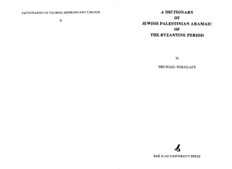
A dictionary of Jewish Palestinian Aramaic of the Byzantine period (Dictionaries of Talmud, Midrash, and Targum) PDF
415 Pages·1990·44.793 MB·English
Most books are stored in the elastic cloud where traffic is expensive. For this reason, we have a limit on daily download.
Preview A dictionary of Jewish Palestinian Aramaic of the Byzantine period (Dictionaries of Talmud, Midrash, and Targum)
Description:
Since the Middle Ages, lexographies of Talmudic and other rabbinic literature have combined in one entry Babylonian, Palestinian, and Targumic words from various periods. Because morphologically identical words in even closely related dialects can frequently differ in both meaning and nuance, their consolidation into one dictionary entry is often misleading. Scholars now realize the need to treat each dialect separately, and in A Dictionary of Jewish Palestinian Aramaic, Michael Sokoloff provides a complete lexicon of the dialect spoken and written by Jews in Palestine during the Byzantine period, from the third century C.E. to the tenth century.Sokoloff draws on a wide range of sources, from inscriptions discovered in the remains of synagogues and on amulets, fragments of letters and other documents, poems, and marginal notations to local Targumim, the Palestinian Midrashim and Talmud, texts addressing religious law (halacha), and Palestinian marriage documents (ketubbot) from the Arabic period. Many of these sources were unavailable to previous lexographers, who based their dictionaries on corrupt nineteenth-century editions of the rabbinic literature. The discovery of new manuscripts in both European libraries and the Cairo Geniza over the course of the twentieth century has revolutionized the textual basis of Jewish Palestinian Aramaic.Each entry in A Dictionary of Jewish Palestinian Aramaic is divided into six parts: lemma or root, part of speech, English gloss, etymology, semantic features, and bibliographic references. Sokoloff also includes an index of all cited passages. This major reference work, updated to reflect the publication of new texts over the last decade, will both provide students and scholars with a tool for an accurate understanding of the Aramaic dialect of Jewish Palestinian literature of the Byzantine period and help Aramaist and Semitic linguists to see the relationship between this dialect and others, especially the contemporary dialects of Palestine.
See more
The list of books you might like
Most books are stored in the elastic cloud where traffic is expensive. For this reason, we have a limit on daily download.
